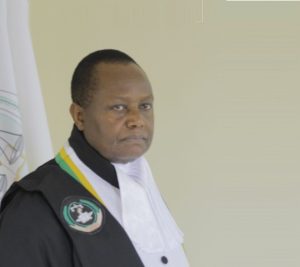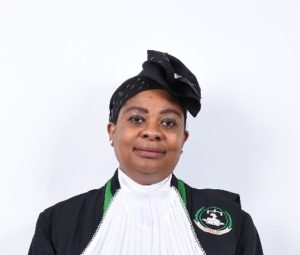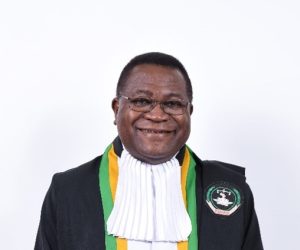NOMINATION AND ELECTION OF JUDGES OF THE AFRICAN COURT ON HUMAN AND PEOPLES’ RIGHTS
African Court Coalition2024-06-11T14:40:10+03:00
UPCOMING NOMINATIONS AND ELECTIONS OF JUDGES TO THE AFRICAN COURT, JULY 2024
The Executive Council of the African Union Commission is due to appoint three judges to the African Court on Human and Peoples’ Rights during its 45th Ordinary Session scheduled to be held in July 2024.
Below are the three Judges of the African Court whose terms shall expire in July 2024:
JUSTICE BEN KIOKO (Kenya)

Justice Ben Kioko was initially elected judge of the African Court on Human and Peoples’ Rights in July 2012 for a six-year term and was then re-elected in July 2018 for another six-year term by the Executive Council of the African Union. Justice Kioko served as Vice President of the Bureau of the African Court from September 2016 to June 2021. HE IS NOT ELIGIBLE FOR RE-ELECTION.
LADY JUSTICE STELLA ISIBHAKHOMEN ANUKAM (Nigeria)
JUDGE BLAISE TCHIKAYA (Republic of Congo)
UNDERSTAND THE PROCESS: CRITERIA, NOMINATION AND ELECTION
How do we ensure we have the right candidates and a balanced bench of Judges of the African Court?
The African Court Protocol and the Rules of Procedure of the African Court provide the following criteria:
Ø The judges of the African Court must be jurists of high moral character, with recognised practical, judicial and academic experience in the field of human and peoples’ rights;
Ø In order to be compatible with impartiality and independence, a judge must not hold political, diplomatic or administrative positions or function as legal adviser at national level.
Ø The AU Executive Council should ensure that the bench as a whole has a gender and regional balance;
Ø No two judges can be from the same country, however State Parties to the Protocol may each propose up to three candidates, at least two of whom shall be nationals of that State;
Ø The bench as a whole should have civil, common law, Islamic, African customary and traditional law experience. State Parties to the African Court Protocol may each propose up to three candidates, at least two of whom shall be nationals of that State;
Which States can nominate candidates?
Only States which have ratified the African Court Protocol can nominate candidates. Currently there are 34 States that have ratified the African Court Protocol, these are: Algeria, Benin, Burkina Faso, Burundi, Cameroon, Chad, Cote d’Ivoire, Comoros, Congo, Gabon, Gambia, Ghana, Guinea-Bissau, Kenya, Libya, Lesotho, Madagascar, Malawi, Mali, Mauritania, Mauritius, Mozambique, Nigeria, Niger, Rwanda, Sahrawi Arab Democratic Republic, South Africa, Senegal, Tanzania, Togo, Tunisia, Uganda, Republic of Congo and Zambia.
In light of the current judges at the African Court, nationals of the following countries cannot be elected: Algeria,Cameroon, Ghana, Malawi, Mali, South Africa, Tanzania and Tunisia.
Call for Candidates and Election Process
Before the elections, the African Union Commission (AUC) sends out information to the Permanent Missions of Member States to the African Union inviting State Parties to the African Court Protocol to submit their candidatures/nominations to the office of the Legal Counsel of the AUC within 90 days.
A list of nominees from State Parties is then transmitted to AU Member States at least 30 days before the session of the Assembly of Heads of State and Government of the AU (the Assembly).
The Executive Council of the AU vote by secret ballot to elect judges of the African Court at its session preceding the Assembly session, then the Assembly votes to confirm the appointment of the judges. Keep yourself updated by regularly checking the announcement webpage of the AU to see the official announcement.
Nomination Process at National Level
For most State Parties to the African Court Protocol the process is not transparent as to how candidates for the election of judges to the African Court are nominated, hence the reason why the African Court Coalition encourages you to engage in this process earlier in advance at your respective capacities by sending recommendations of suitable and qualified candidates to your respective governments.
We further encourage nominations of qualified female candidates to ensure gender representation at the African Court, currently there are 6 male judges and 5 female judges.
Please also circulate this information within your networks as wide as possible.
The Role of CSOs in the Nomination and Election Process
Among the major roles of Civil Society Organisatios is to monitor the nomination process both at national level, and the election process at the AU level. CSOs should lobby their governments to nominate qualified candidates in accordance with the criteria set out under the African Court Protocol. They should also collaborate with the media to raise awareness.
Key Tips:
Ø Identify and Profile qualified candidates within your country and lobby your government to submit the most qualified candidate to the AU Office of the Legal Counsel
Ø Collaborate with the media channels to discuss the nomination and election and the profile of candidates
Ø Network in support of the most qualified candidate’s nomination and election to raise their profile and provide them with platforms to express their views and talk about their professional experience in the field of Human Rights.
Why Does the Process Matter?
You should be aware of this information earlier in advance so that you can be part of the process by recommending to your government the right candidates that can sit at the bench of Judges of the African Court on Human and Peoples’ Rights in order to have an effective, independent and impartial African Court that delivers on its mandate.
DO YOU KNOW HOW CANDIDATES FOR THIS VACANCY AND OTHER VACANCIES OF THE AFRICAN HUMAN RIGHTS MECHANISMS ARE NOMINATED IN YOUR COUNTRY? PLEASE HELP US UNDERSTAND BY TAKING PART IN THIS QUESTIONNAIRE WITH JUST 7 QUESTIONS:
WANT TO KNOW MORE ABOUT THIS SUBJECT? FOLLOW THIS LINK TO ACCESS A COMPILATION OF PREVIOUS STUDIES, ARTICLES AND REPORTS ON THE SUBJECT FOR THE AFRICAN HUMAN RIGHTS SYSTEM AND OTHER REGIONAL HUMAN RIGHTS SYSTEMS. PLEASE NOTE THAT MOST OF THE COMPILED MATERIALS ARE NOT OWNED BY THE COALITION, THEY HAVE BEEN COLLECTED FROM PUBLIC DOMAINS FOR THE PURPOSE OF KNOWLEDGE SHARING ONLY.
Among the leading roles of the African Court Coalition is its role to advocate for a transparent process of nomination and election of candidates to the bench of judges of the African Court on Human and Peoples’ Rights, advocate for CSOs participation in the nomination process and contribute to the reinforcement of the independence of the judiciary.
Article 4 of the Coalition Constitution (Aims and Objectives of the Coalition) reads;
“The objectives of the Coalition are to;
Ø 4.1.5 Advocate for a transparent process for the nomination and election of candidates to the African Court (or the Merged Court once established), which guarantees equitable representation of the African judicial systems and gender, both in the nomination and election of judges.
Ø 4.1.6 Advocate for full participation of Civil Society in the nomination of judges
Ø 4.2.3 Contribute to the reinforcement of the independence and impartiality of the judges, specifically through a transparent process of nomination and election……..”








Comment (1)
Hi,my name is LIONGI ,I am a focal point of African court on human rights and peoples in my country the Democratique Republique of Congo.I noticed that there is no congolese judges in the Court.As focal point,what can I do for my country to be represented in the court
I ned more information ,please